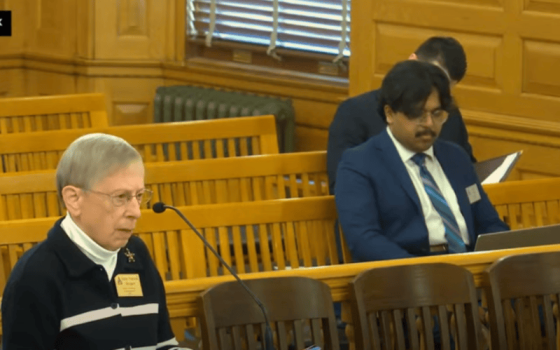
In the Fall of 2010 I was invited to celebrate the Eucharist in the detention center in El Paso. The detention center houses 800 persons who have been picked up by the border patrol for immigration violations. Most were from Mexico, but others were from Pakistan, Romania, and Africa. I passed through the security gates and saw uniformed officers, rows of border patrol SUV’s, barbed wire, cameras, grey bricked buildings. A patrol van was parked with the rear door opened.
I can still feel the terror that struck me when I saw the large box of steel shackles glistening in the sun. “Chains for human beings”, I thought. A different kind of slavery is still lurking in our midst. I realized I had just walked into the world where 800 people had exchanged their former identities to become “detainees” waiting “to be processed” and deported.
After the usual clearance procedures, I was escorted by Sr. Bea, a religious sister and chaplain, to the mess hall where the liturgy was to take place. Two masses were celebrated-- one for men and another for women. The mass had to be done in thirty minutes. The detainees wore colored jump suits: most were in blue, those in orange had a connection with drugs, and those few in red were the "violent" category. At no time during the liturgy were the red/oranges to mix with the blues.
What struck me was the range of ages. There were young people and the elderly. Imagine people from a normal neighborhood all placed behind bars. And yet, with the intense security, the conditions seemed humane. The detention guards seem to treat the detainees with respect and courtesy. The mess hall was clean and dignified; colorful flags from all the nations hung from the ceiling.
There were moments during the mass when I choked up over the words of the assigned ritual prayers or scripture readings. I used the gospel reading from Luke 4.18-19 assigned for the following Sunday: tt
He has sent me to proclaim freedom for the prisoners
tand recovery of sight for the blind,
tto set the oppressed free,
tto proclaim the year of the Lord’s favor.
Imagine oneself behind bars listening to this reading on liberation. I told the people that on this Friday afternoon they were the first to hear these read-ings "in the whole world.”
Moments of hope can emerge behind bars. A young woman in a blue jump suit was introduced to me. She was born in Mexico and brought to the States as an infant when the border had fewer restrictions. Her parents never secured the necessary papers for residency. She was a graduate of the Tepeyac Institute and a qualified lector and Eucharistic minister for the diocese. She now directs scripture classes and prayer groups for some of the detainees, some who are contemplating becoming Catholic. Spreading the fire of the Gospel of Jesus Christ continues even in the detention center!
I cannot describe adequately this experience; my emotions were turned inside out. These are good people, poor people, a frighten people detained behind barbed wire, because of a broken immigration system and the very mixed consecuences of economic policies like NAFTA. Behind these bars are a people searching for work to put food on their tables or escaping from dreadful violence. Something is terribly wrong!
When mass had finished, I was acutely aware that I would be leaving these people behind, and yet, I would walk through those gates still feeling that I am in jail. I am held “hostage” in the outside world by this broken system. The hunger of the poor is my hunger; their trauma caused by senseless vi-olence in their homeland is my trauma. We all struggle for the same free-dom and fulness of humanity. We are all implicated in this web of dehuma-nizing relationships.
As I packed my things to leave the mess hall, the women, more than 150, remained seated while the guards made “the count.” When I turned to leave, it seemed that all eyes, sad eyes, were on me. The women began to clap softly. My overwhelming feelings were telling me to “come back” -- telling me not to forget them. This moment was burned into my heart. Was the Eucharist a moment of hope and consolation? No doubt. I needed time to unravel what this had all meant. I needed to spend time alone. I wanted to find a chapel and be silent.
There was no other response.
One thing for sure: these people are not criminals. Who will be accountable for their suffering?
Bob Dueweke is an Augustinian priest and the director of the Tepeyac Institute, a school for ministerial formation and theological study, for the diocese in El Paso, Texas. (On Facebook @ “Instituto Tepeyac”.)



